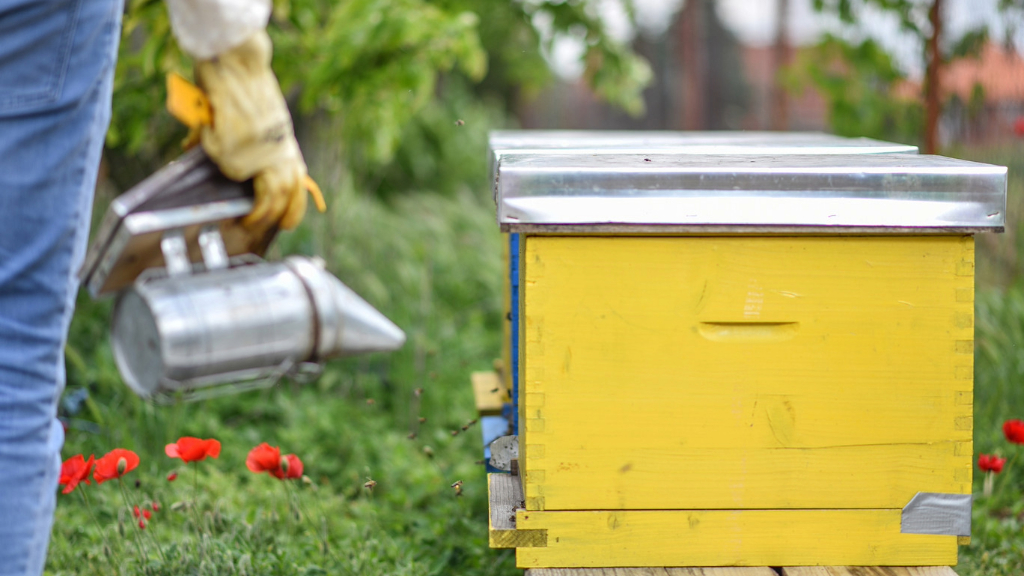Why Does Bee Decline Matter: What All Gardeners And Consumers Need To Know


Like most of us, I've known our bees are in trouble, and that there must be more to their decline than pesticide use. What I didn't know is the bigger picture that's involved in the depletion of our precious, vital bee population. I recently viewed an award-winning documentary film called The Pollinators. Learning the truth about the decline of bees has served as a high-level alert to me, and it should to you, too.
The cinematographer, producer/director of the film, Peter Nelson, describes it as "an important story people don't know they need to know." It's also a story that "matters only if you like to eat."
Why Does Bee Decline Matter?
If we take a moment to think about it, most of us assume our fruit and nut orchards continue to produce each year as a normal seasonal process. It's not so.
Beekeepers constantly truck thousands of hives across the country, supplying bees on a temporary basis to almond orchards in California, apple orchards in Washington and blueberry fields in Maine, just to mention a few. In many instances, if these farmers were to stop "renting" the service of these traveling bees, there would be no crops.
The naturally occurring pollination process for many of the foods we eat daily has become nonexistent since there are no longer enough bees to naturally pollinate the plants' flowers. Semi-trucks criss-crossing the country hauling rentable beehives is now commonplace in our country.
Pollinator Problems in Our Nation
There's a complex problem with our nation's farming methods, not to mention the added carbon footprint involved in trucking the bees.
Much of our vast farmland acreage, the "breadbasket" of our country's Midwest, is cultivated as a "monoculture." What that means is that, primarily, corn and soybeans dominate the farmscape for miles and miles. A few decades ago, it became important to our large scale farmers to simplify their cultivation methods, which involves heavy tilling, synthetic fertilizers and pesticides. Weeds, cover crops, and areas of untilled soil inevitably interfere with and add work to farming of neatly kept, row upon row of corn and soybeans. Simplification of large farm operations, both in terms of expense and practicality, has exacted a high price.
Sign up for the Gardening Know How newsletter today and receive a free copy of our e-book "How to Grow Delicious Tomatoes".
Vast expanses of our country's soil have become dead, in a sense. Monoculture farming and over-tilling of the soil has left thousands of acres with insufficient nutrients. Worms, insects and pollinators that once actively thrived in these vast areas are no longer attracted to the nutrient-poor environment. Bees are dying by the thousands due to chemical exposure and opportunistic mites. While simpler for the farmers, these methods have ravaged the formerly rich environment enjoyed by bees.
Fortunately, many farmers are starting to incorporate more sustainable practices, and the changes are beginning to show. But is it enough, and will it be soon enough?
What We Can Do for the Decline of Bees
Bee decline impacts us all. And while Peter Nelson is an astute documentarian, he is also an optimist. As a long-time beekeeper with a keenly heightened insight into the pollination process, he feels the problems are scalable. Peter Nelson is certain that, as individual gardeners and consumers, we can have an enormous effect on encouraging and generating a return of the pollinator population.
Like me, you may be wondering what one individual can do to help bring about change.
As a gardener you can:
- Rotate and vary your garden crops each season. Learn about sustainable gardening.
- Set aside no-till areas in your yard where the soil won't be disturbed. Seeding cover plants like rye or vetch and adding manure and compost will allow these areas to grow, die and regrow, feeding the soil and attracting hungry pollinators.
- Plant lots of blooming shrubs, trees, herbs and flowers in your yards, planters and window boxes.
- Don't make your lawn a monoculture. Allow dandelions, clover and other seeds to grow. Adopt a new respect for a diversified lawn.
- Plant flowers in your yards, window boxes, planters and neighborhood sidewalks.
- If you have the space and means, maintain a beehive.
- Show your children and grandchildren the miracle of growing vegetables from a small seed, and teach them about where their food comes from. Some kids assume food is magically produced at the grocery store, wrapped in plastic.
Peter Nelson comments, "The reality is that most of us are 3-4 generations away from the farm; so many of us have lost the idea of where our food comes from and who grows it.
As a consumer you can:
- Eat seasonally - buy and eat what's naturally available during each season of the year. For example, avoid buying fresh raspberries in the dead of winter if you live in a cold-climate state.
- Buy regionally grown food - shop at farmer's markets and try to eat what's grown within 50 to 100 miles of your home. Talk to your grocers about obtaining locally grown produce.
- Encourage your supermarkets to offer more organically grown food, and pay a few extra cents for it. It's worth it in so many ways.
As a citizen you can:
- Talk to your local garden clubs, community centers bio-parks and municipal organizations about booking The Pollinators for a public screening at local theaters, universities, libraries and other public venues. Use the film as an organizing element for events like tastings and panel discussions.
- Encourage your city and county planners to plant for pollinators in public parks, median strips and municipal properties.
- Work toward a no-spray policy on public grounds, with local government agencies and highway departments. Counties can and do place bans on chemical spraying.
- Maybe you live in a state that already has or plans to pass legislation for pollinator protection. Encourage your state and county representatives to become educated about the issues.
- If your local schools are lucky enough to have a school gardening program, be sure your teachers are aware of sustainable methods, and that our children are learning how to treat the earth with respect.
- Knowledge and good habits all start when we're young. If your local schools don't have gardening programs, look into assisting them with grants and volunteer labor.
These practices can have a positive impact, not only for bees and honeybees, but for the many thousands of pollinator species. Let's hope we have enough time and enough passion to turn things around for our priceless pollinator populations. Their importance to life on our planet is immeasurable. We each need to do what we can individually, if only simply to educate our friends and families about the issues, and we need to make it happen soon.

Caroline Bloomfield is Manager of Marketing Communications at Gardening Know How since 2019. A northwest native, she has resided and gardened in multiple zones in the U.S. and is currently at home in Bandon, Oregon. Writing and editing for various publications since 1998, her BA in American Studies from Southern Maine University includes an emphasis in English. She was raised in California by avid gardeners and continues to enjoy the natural world with an appreciation for the concepts of sustainability and organic care for the planet.